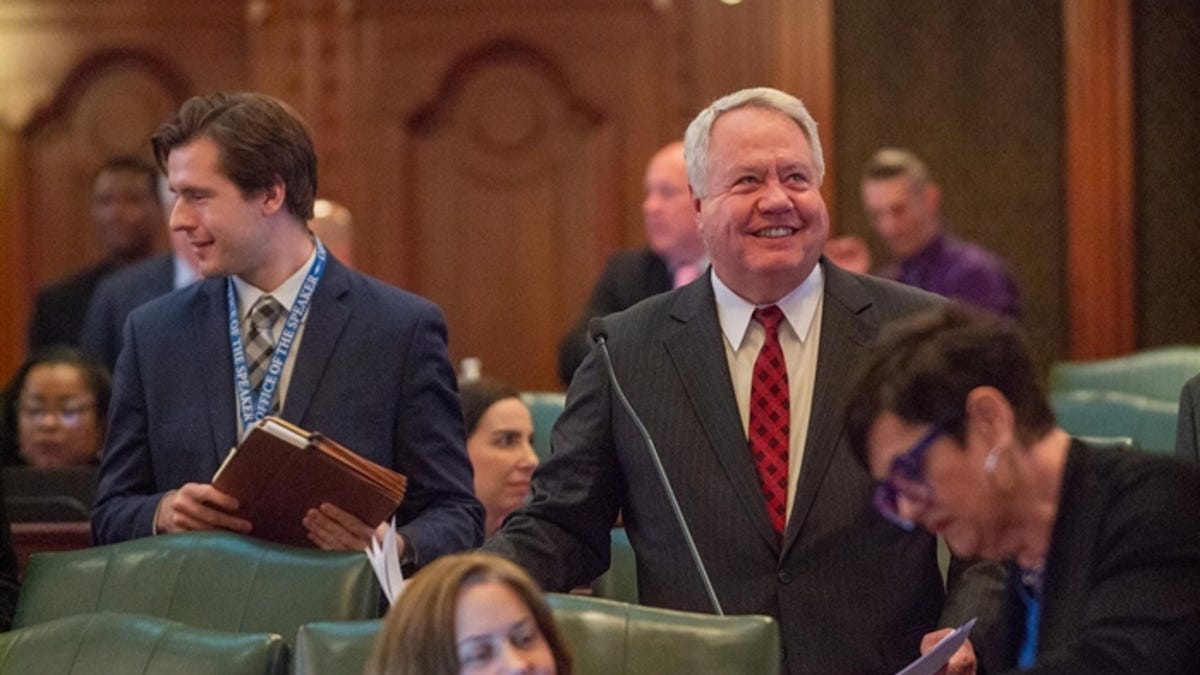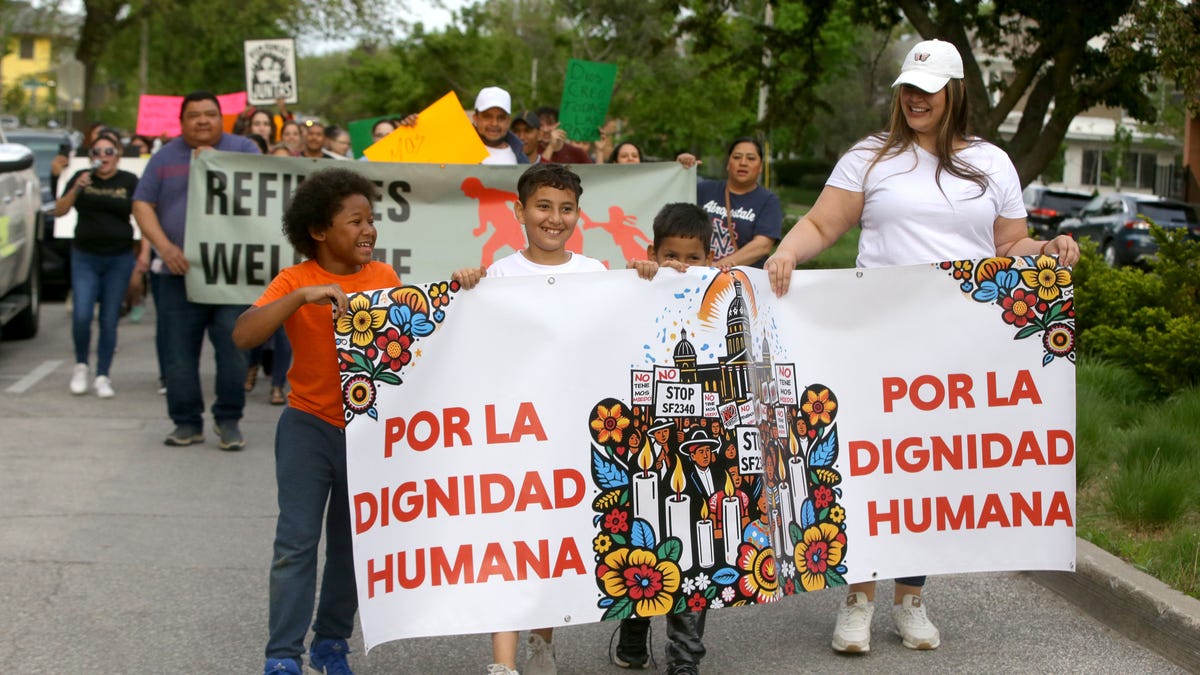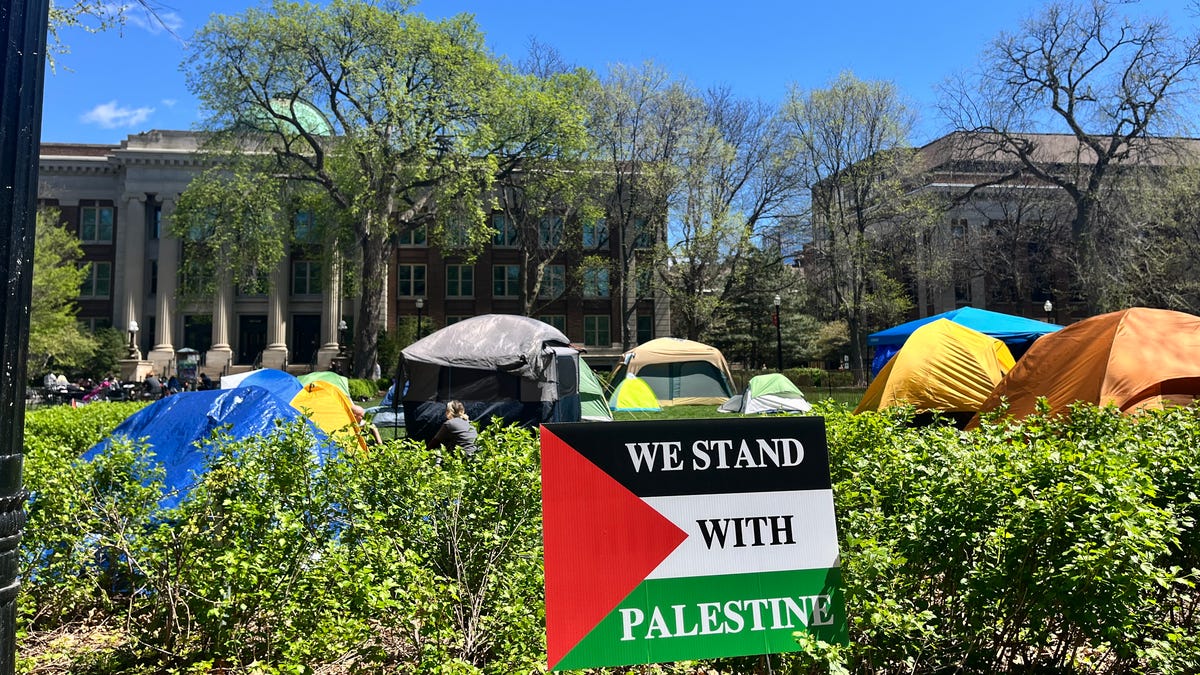Louisiana
Louisiana Gov. Jeff Landry signs tough-on-crime legislation
BATON ROUGE, La. (AP) — Eight recently passed bills, including legislation that will treat all 17-year-olds who commit crimes as adults and harsher penalties for carjackings, were signed by Louisiana Gov. Jeff Landry on Wednesday.
Spurred by violent crime in Louisiana cities and a new tough-on-crime governor, the GOP-dominated Legislature gathered for a two-week special session last month to address crime — at which time they passed a slew of policies that will overhaul elements of the state’s criminal justice system.
Among one of the most controversial bills passed this session and signed by Landry is a measure that will roll back Louisiana’s “Raise the Age” law — a historic bipartisan criminal justice reforms passed in 2017. The new legislation will treat all 17-year-olds charged with crimes, including misdemeanors, as adults.
During Landry’s ceremonial signing bills into law in New Orleans on Wednesday, he also gave his seal of approval to legislation that makes certain juvenile criminal records public, funding for a new Louisiana State Police contingent in New Orleans — dubbed Troop Nola — and a measure that gives law enforcement officers “qualified immunity from liability.”
In addition, Landry signed several bills that toughen penalties for certain crimes — including a minimum of 25 years in jail in cases where someone distributes fentanyl in a way that appeals to children, such as the shape, color, taste or packaging design.
A day earlier, Landry signed a wave of bills that include expanding death row execution methods, concealed carry of a gun without a permit and legislation that effectively eliminates parole for most jailed in the future.
The new Republican governor has vowed to crack down on crime in Louisiana, a state that in recent years has had one of the highest homicide rates in the country. The issue became a pivotal part of his gubernatorial platform as he often pointed at New Orleans, which has been in the national spotlight for violent crime and will be the site of the 2025 Super Bowl.
As in other parts of the country, violence surged in Louisiana following the onset of COVID-19. And while data from the Federal Bureau of Investigation shows that crime has steadily decreased in Louisiana over the past decade, New Orleans has continued to struggle with a surge of killings.
Louisiana’s debates during the special session echo conversations taking place in statehouses across the country, including over how long someone should go to prison, how to handle juvenile offenders and if and when incarcerated people deserve a second chance.
Republicans say the bills passed this session prioritize victims and will keep criminals behind bars and off Louisiana streets. Democrats say most of the measures won’t deter crime and that lawmakers needs to take a holistic approach, digging deeper to address the root of the issue.
Lawmakers won’t have to wait long for another chance to tackle the challenges Louisiana faces, as the Legislature will convene again next week for the start of their regular three-month session.

Louisiana
Election chaos in Louisiana as only state without a congressional map for fall ballot
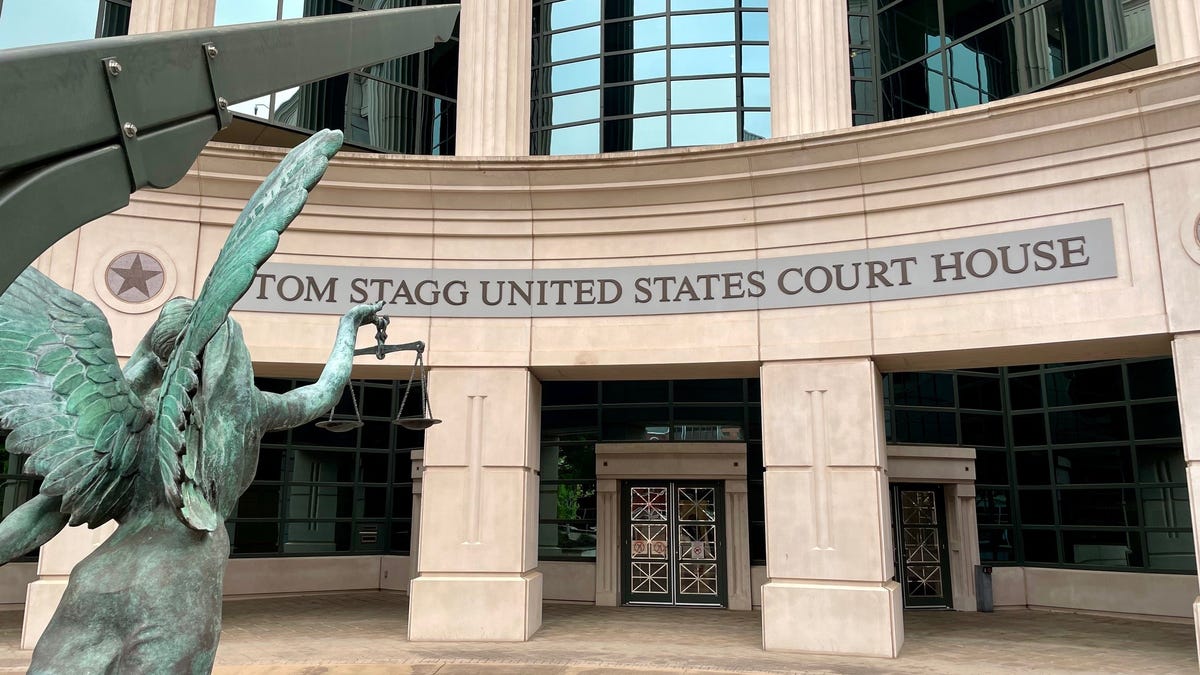
A federal court panel’s divided decision to throw out Louisiana’s congressional boundaries has left the state without a map to hold the Nov. 5 election and less than two weeks to produce one before the state’s chief elections officer’s deadline to conduct a fall ballot.
The three-judge panel issued a 2-1 decision Tuesday ruling Louisiana’s congressional map creating a second Black majority district was unconstitutional because of “an impermissible racial gerrymander,” siding with the plantiffs who sued to block the boundaries.
U.S. Western District Judges Robert Summerhays and David Joseph, both nominated by President Trump, sided with the plaintiffs. Fifth Circuit Court of Appeals Judge Carl Stewart, nominated by President Bill Clinton, dissented.
The court has scheduled a status conference at 10:30 a.m. May 6 to discuss what’s next for the state and intervenors who defended the map and the plaintiffs who successfully challenged it.
Louisiana Attorney General Liz Murrill told USA Today Network Thursday she expects to file a motion with the panel by Friday to permit the state to implement the rejected map pending an appeal of its verdict to the U.S. Supreme Court.
Meanwhile, the NAACP Legal Defense Fund, a group of Black voters and other civic organizations have already filed a notice of appeal with the U.S. Supreme Court asking it to allow the rejected map to remain in place as an emergency remedy for the 2024 election until a new map can clear the courts.
The NAACP Legal Defense fund will also enter Monday’s hearing with its own preferred map that would create a second majority Black district.
“We will continue fighting on all fronts for a map that has two majority Black district as a matter of fair and constitutional representation as we have been for the past two years,” NAACP Legal Defense Fund attorney Jared Evans told USA Today Network.
Evans said he doesn’t believe two weeks is enough time for the panel or Louisiana Legislature to craft a new map, which is why the intervenors have asked the Supreme Court to allow the rejected map to be implemented for the 2024 elections only.
“Louisiana is the only state that doesn’t have a congressional map,” he said. “This is an emergency.”
But Paul Hurd, an attorney with the plaintiffs who will likely have their own map to submit, dismissed those concerns.
“With the technology we have today we can draw a map in 4 hours,” Hurd said. “We can definitely deliver an answer by (Louisiana Secretary of State Nancy Landry’s) May 15 deadline.
“I think we’re right on schedule, but we’ll find out Monday. If the court asks for proposals I’m sure we’ll have one.”
The federal panel could also commission what’s known as a special master to draw a new map it finds acceptable.
At stake are the political careers of the incumbents and scope of representation for the state’s Black voters.
The plaintiffs successfully challenged the map by attacking the new majority Black 6th Congressional District boundaries stretching from Baton Rouge to Lafayette to Alexandria to Shreveport as unconstitutional, arguing they they didn’t meet traditional redistriction principles like compactness and preserving communities of interests.
The state contended additional factors drove the map, including the politics of protecting powerful incumbent Louisiana Republicans U.S. House Speaker Mike Johnson (4th District), Majority Leader Steve Scalise (1st District) and Julia Letlow (5th District), a member of the Appropriations Committee that controls the country’s pursestrings.
Doing so put Republican U.S. Rep. Graves, the current 6th District congressman, in peril by dismantling his boundaries in favor of a majority Black voter population.
The lawsuit was just the latest litigation challenging the state’s ever-shifting congressional boundaries since the 2020 U.S. census.
Late last year a federal appeals court signaled it would uphold Baton Rouge Middle District Judge Shelly Dick’s earlier ruling requiring Louisiana’s previous congressional map be redrawn to include a second majority Black district out of six to comply with the Voting Rights Act.
The Republican-dominated Legislature complied and new GOP Gov. Jeff Landry signed into law the newest map in January, only to have it thrown out this week by the three-judge panel after a three-day trial in Shreveport in early April.
More: Federal judges throw out Louisiana congressional map with second Black District
Greg Hilburn covers state politics for the USA TODAY Network of Louisiana. Follow him on Twitter @GregHilburn1.
Louisiana
Louisiana hip-hop artist shares her experience with domestic violence to help others
When Hip-hop artist Mim “Mimzy” McCoy performs in front of a crowd, it is with a feeling of confidence and empowerment.
She has not always felt that way, in fact, she has felt the exact opposite. But, that was before she finally freed herself from an abusive relationship that lasted six years.
She was the one woman, in the statistic that says one out of every three women will experience domestic violence in their life, according to the World Health Organization.
During that time, she lived her life in fear that she would become another painful Louisiana statistic, a victim of femicide, the intentional murder of women. Louisiana ranks 5th in the nation according to the Louisiana Coalition Against Domestic Violence.
“I’m a living miracle, I have seen the angel of death in person,” McCoy said.
“We live in a world that allows domestic violence to occur,” said Project Celebration’s Outreach and Children’s Advocate Aslan Godfrey, who also stated that the first five 2024 homicides in Shreveport were femicides. “To put it in perspective, in the state of Louisiana, at least 100 children each year lose a parent to domestic violence.”
Located in Northwest Louisiana, Project Celebration is a nonprofit that provides direct services to survivors of domestic violence, sexual assault and children experiencing violence. It currently operates 2 domestic violence shelters that provide safe housing for women and children fleeing domestic violence as well as medical, personal and court advocacy. “Our hotline for domestic violence is ringing all day, whether that’s just for safety planning, or someone reaching out for counseling or financial assistance,” said Godfrey.
It’s a service that McCoy thinks is necessary but did not use herself. Her separation from her abuser took years.
Today McCoy is most thankful to God. During one of the lowest points in her relationship, after years of abuse, she recalls God “speaking” to her. “He told me that my children and I would be restored.” It would take years to get fully free, much more time than it took for her to get into the relationship.
“I wasn’t really looking for anybody to come save me,” McCoy recalls of the beginning of her relationship. However, she admits that it was a troublesome time in her life, as she was living in between homes and couch surfing at friends’ houses. She was also very young, 18. He was several years older.
She remembers it was quick decision to move in with him and now feels she lacked the mental skills to make a more rationalized decision, “There was a lot of me feeling like I was already in the wrong, mixed with the desperation, and then the first man that showed me attention… I was like, yep, I’m moving in with you.”
She had yet to heal from a difficult childhood, leaving her vulnerable without realizing it, “I just didn’t get love as I should have as a child.”
For a while, she felt she was the one in control. She describes herself as a rebellious child who did things the way she wanted. However, that control slipped away, and her personality slowly changed from the toll of emotional abuse she was experiencing.
“There’s so much psychological abuse that goes on with domestic violence. It’s so important to recognize the signs and symptoms,” Godfrey said.
Some of the signs that a relationship is unhealthy:
- Isolating someone form their support system.
- Being verbally demeaning.
- Gas lighting
- Controlling finances
- Preventing a person from making their own choices
- Pressuring a person to do things and using threats or intimidation.
“Domestic violence is never the victim’s fault,” said Godfrey.
It was not long before the abuse became physical in McCoy’s situation.
It was a normal fight, but then it crossed the line, McCoy recalls, “It’s like flashes of lightning… you can’t even think because there’s a fist in the side of your head, or your heads being thrown into something, and you’re completely disoriented and don’t know where you are. There was nothing I could do. He was completely overpowering me.”
McCoy called the police, but when the time came for her to report the domestic violence, she had already listened to all his apologies. “He showed me all this love and then he was like, ‘I’m just I’m so sorry. I’m so sorry,’ and his apology was just so sincere. By the time the police got there, I was like, ‘No, it really wasn’t that big of a deal.’”
She decided to believe in her fantasy that he was her Prince Charming, with all the promises of a better life, “I was trying to figure out how to fix it because I loved him. I had a place to live, I had a man who was attractive, who was going to be contributing to the household, and that was going to be my white picket fence.”
When the next time came, there were more reasons to stay, and a little less of the original McCoy to fight back. She said that with the gaslighting, the narcissism and the manipulation, she was slowly, “being stripped of any bit of myself that I was becoming, or even was.”
“Domestic violence is about power and control,” said Godfrey, “It’s ‘what can I do to keep control over this victim?’, whether that’s mental, physical, emotional, financial, spiritual, there’s so many different types of abuse and tactics that abusers use to keep that power and control over that victim.”
For McCoy that meant controlling her finances, food and transportation, “He controlled every single aspect of my life, so I was completely reliant upon him.” He had also separated her from her family, “He was the only person I had to depend on. He was all I had.”
It also meant she was still trying to ‘fix’ the relationship. McCoy felt that having a child would offer a solution, “I’m going to love the baby so then he’s going to love the baby. This is going to fix him; this is going to fix us.” But, she said, it did the opposite, it made it worse. A second child also did not help.
As the years went by the beatings continued, “it’s like having a record on repeat.” Most of her bruises would be in places that did not show to the public. She learned to disassociate from her body during the beatings, “I would leave my body. I just didn’t want to feel it and if I knew it was coming, I would just literally, because of the pain, I would just leave my body,” she said.
It continued to get worse, the police were called numerous times, McCoy would be in a state of hysteria, and they would ask her is she wanted to go to a hospital. She would say yes. It became a reprieve from her dysfunctional home life.
It would also be the start of her education of what domestic violence was and what were the effects of it. “I would pay attention in groups to what they were teaching us and I would ask them for study material,” McCoy recalls, “I started studying psychology in depth.”
“’How am I going to fix it now?’” McCoy thought, “I was numb, I was so depressed, I was beyond depressed, I was jaded. I felt nothing, but I felt everything.”
She decided she had to get out, there was no fairytale in this story. “My journey of ‘I have got to get the hell out of the situation,’” happened during a particularly bad fight McCoy recalls, “I was in full attack mode, I was sick of it. I was going to fight back.”
It would not be that night, which left her with a broken nose and describing herself as barely escaping death, but it would be soon. “I heard God say to me that I would leave, I would live, I would leave when I least expected it and literally the next day is when I left.”
Her life after she left was one of hiding, “I didn’t leave the house unless I absolutely had to, like if I had to go to the grocery store, and it was just constantly looking over my shoulder.”
“A lot of survivors that we know will deal with PTSD,” said Godfrey, “You’re constantly hyper vigilant, wondering, ‘What’s next? What’s going on? Is something going to happen? Am I safe?’”
McCoy started to remember who she used to be, “I remembered I was talented and I’m still talented. So, I just started painting and writing and rapping, I poured all of myself into it.”
“It was really my grace,” McCoy says about her art, “It just opened it up for me to be able to see myself as a beautiful talented, intelligent, loving kind and not sick person. Whereas I had been told the entire time I was with him the exact opposite of that.”
“I’m free,” she says 10 years later, “I decided I wasn’t going to look over my shoulder anymore. It’s pretty cut and dry. I just decided that I was not going to be scared to live.”
“It is such a “taboo” topic to talk about,” said Godfrey, “but it is so necessary to educate our youth and break cycles of generational trauma.”
Today McCoy lives her life with a lot of introspection, she relies on “knowing there’s a higher power that’s in control of everything. Sometimes, you have to let go of the situation in order to gain control of the situation.”
“For a very long time, I was suppressed, I couldn’t speak, I couldn’t do anything. I had no ability to reach out for help. And then one day, all of the heart and all of the emotions surfaced.” recalls McCoy who began exploring her love of writing and music. “I put my poetry into rap,” she said, “I was able to get all of this emotion and all of this hurt and all of this pressure up and out of me.”
“Never give up,” McCoy says about the journey of healing, “no matter how many times you have a panic attack, no matter how many times you have anxiety attacks, no matter how many times you feel like you may never trust anybody again.”
As a way to help other victims McCoy has joined the Caddo/Bossier Domestic Violence Task Force. She believes that telling her story not only helps her but also might help others.
“Anyone can be victimized by domestic and sexual violence. Anyone can also be the perpetrator of domestic and sexual violence,” said Godfrey, “Whenever someone asks me what “advocacy” is, I tell them that it looks different every day. My job is to show up educated, unbiased and collected in order to meet survivors where they are at in their healing journey.”
If you or someone you know needs help call:
Louisiana
Louisiana congressional map ruling appealed to the U.S. Supreme Court
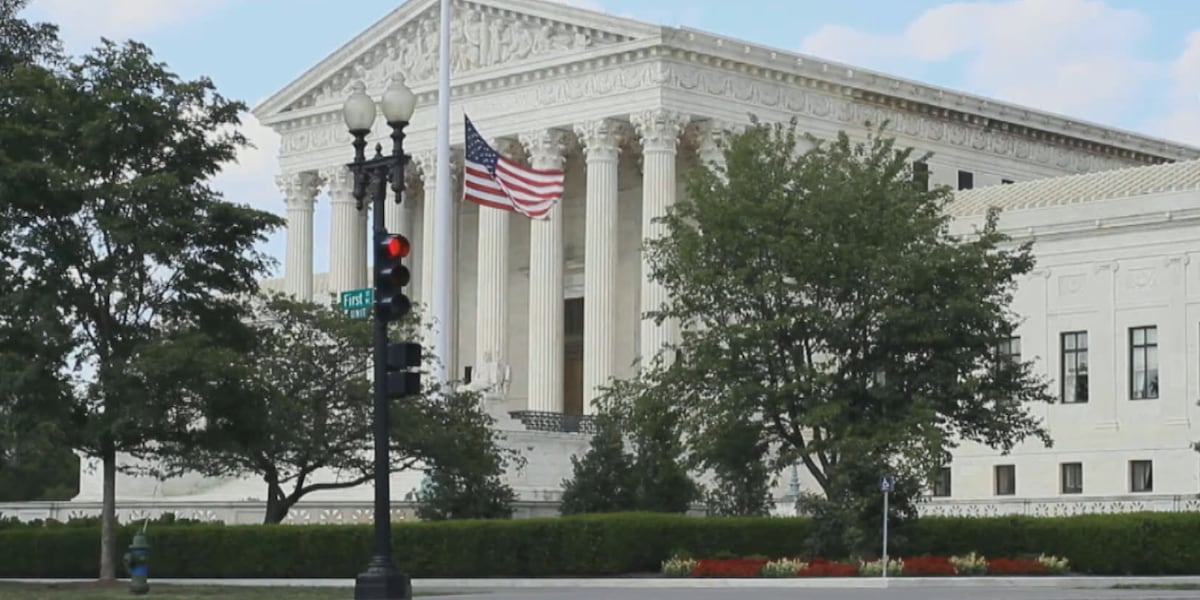
SHREVEPORT, La. (KSLA) — The Louisiana NAACP, the Power Coalition for Equity and Justice and nine individuals appealed a ruling on Louisiana’s congressional map to the U.S. Supreme Court on Wednesday (May 1).
A Louisiana public service commissioner told KSLA News 12 they filed the appeal because they are going to keep fighting to have two majority-minority districts since one-third of the state’s population is African-American.
Read the appeal:
On Tuesday, a federal three-judge panel overturned the map that includes a 6th Congressional District that stretches from Shreveport to Baton Rouge.
[ Louisiana won’t immediately get a new majority-Black House district after judges reject it]
“The court’s decision yesterday puts us in complete flux because we have elections coming down in November. The state has argued they need a congressional map by May 15,” District 3 Public Service Commissioner Davante Lewis said Wednesday. The Democrat is one of the plaintiffs in the case.
Earlier this year, a judge asked Louisiana lawmakers to create a new congressional map because the previous one violated the Voting Rights Act.
A Louisiana state senator said he supports the court’s decision to overturn the latest map.
“What the court said is that the racial component would be a violation of the Fourteenth Amendment protection laws that are provided under the United States Constitution,” said District 38′s Thomas Pressly, who is a Republican.
The Louisiana Democratic Party issued the following statement:
“Despite this ruling, it remains evident that a second Black majority district is essential for ensuring fair and equitable representation for Black voters in Louisiana. We are steadfast in our commitment to advocating for the fundamental rights of Black Louisianians whose voting influence has consistently faced significant dilution.”
A Shreveport resident told KSLA News 12 it is important for the state of Louisiana to have fair representation with the congressional map.
Another person who identified herself only as Mrs. Peggy had a different thing to say. “I am neutral.”
Copyright 2024 KSLA. All rights reserved.
-

 News1 week ago
News1 week agoLarry Webb’s deathbed confession solves 2000 cold case murder of Susan and Natasha Carter, 10, whose remains were found hours after he died
-

 Education1 week ago
Education1 week agoVideo: Dozens of Yale Students Arrested as Campus Protests Spread
-

 World1 week ago
World1 week agoHaiti Prime Minister Ariel Henry resigns, transitional council takes power
-

 News1 week ago
News1 week agoFirst cargo ship passes through new channel since Baltimore bridge collapse
-

 World1 week ago
World1 week agoUS secretly sent long-range ATACMS weapons to Ukraine
-

 World1 week ago
World1 week agoSpanish PM Pedro Sanchez suspends public duties to 'reflect'
-

 News1 week ago
News1 week agoAmerican Airlines passenger alleges discrimination over use of first-class restroom
-

 World1 week ago
World1 week agoAsia bears biggest climate-change brunt amid extreme weather: WMO
